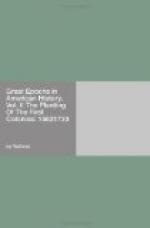His Ruine being thus gradually carried on, his Misery was not prevented but augmented thereby; being himself made acquainted with the Sence and experimental Feeling of the captivity of his Children, loss of his Friends, slaughter of his Subjects, bereavement of all Family Relations, and being stript of all outward Comforts, before his own Life should be taken away. Such Sentence sometimes passed upon Cain, made him cry out, that his Punishment was greater than he could bear.
This bloody Wretch had one Week or two more to live, an Object of Pity, but a Spectacle of Divine Vengeance; his own Followers beginning now to plot against his Life, to make the better Terms for their own, as they did also seek to betray Squaw Sachim of Pocasset, Philips near Kinswoman and Confederate....
Philip, like a Salvage and wild Beast, having been hunted by the English Forces through the Woods, above an hundred Miles backward and forward, at last was driven to his own Den, upon Mount-hope, where retiring himself with a few of his best Friends into a Swamp, which proved but a Prison to keep him safe, till the Messengers of Death came by Divine Permission to execute Vengeance upon him, which was thus accomplished.
Such had been his inveterate Malice and Wickedness against the English, that despairing of Mercy from them, he could not bear that any thing should be suggested to him about a Peace, insomuch as he caused one of his Confederates to be killed for propounding an Expedient of Peace; which so provoked some of his Company, not altogether so desperate as himself, that one of them (being near of kin that was killed) fled to Road-Island (whither, that active Champion Capt. Church was newly retired, to recruit his Men for a little Time, being much tired with hard Marches all that Week) informing them that Philip was fled to a Swamp in Mount-hope whither he would undertake to lead them that would pursue him. This was welcome News, and the best Cordial for such martial Spirits: whereupon he immediately with a small Company of Men, part English and part Indians, began another March, which shall prove fatal to Philip, and end that Controversie betwixt the English and him: for coming very early to the side of the Swamp, his Soldiers began presently to surround it, and whether the Devil appeared to him in a Dream that Night, as he did unto Saul, forboding his tragical End (it matters not); as he intended to make his Escape out of the Swamp, he was shot through the Heart by an Indian of his own Nation, as is said, that had all this while kept himself in a Neutrality until this Time, but now had the casting-vote in his Power, by which he determined the Quarrel that had held so long in Suspense.
[1] From Hubbard’s “Narrative of the Troubles with the Indians of New England.” Hubbard was graduated from Harvard in 1642 in the first class sent out by the college. In 1666 he was settled as minister at Ipswich, Mass., and died in 1704. His qualities as a minister, his learning and his ability as a writer were praised by John Eliot, the apostle to the Indians.




